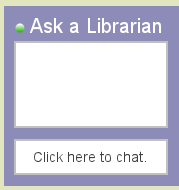Services & Policies - Fall 2000
EZ Proxy System Eases Off-Campus Searching
- Over the past ten years the Internet has brought sweeping changes to the way students research material. Most of the material is still found in the library, but much of the material is found online in databases. The University of Scranton provides a number of databases that not only provide information, but also the full text of the document online. This development opens more opportunities for distance education programs to flourish and enhances the student's ability to access information when it is needed. To enhance the existing off-campus access, the Weinberg Memorial Library has put into service a system called EZ proxy. The EZ proxy system is a software program that allows an administrator to set up the proxy server and perform the necessary maintenance to the server.
- A proxy server acts as a seamless walkway from a patron's computer to a secured database. When a proxy server is in use all requests for database access come to the proxy server before being sent on to the database's server. The proxy server determines if a user has the right to access the database by starting an authentication process. In the scenario of user accessing a database from on-campus, the request is sent to the proxy server. The proxy server checks the IP address of the user's machine against a listing of valid IP addresses. If the user's IP address is found, the proxy server routes the user's request to the database's server, logging the time of access and the IP address of the user.
- For off-campus users the situation adds one more step. The request for access is received by the proxy server, the same as it would be for an on-campus request, then the proxy server checks the IP address of the user against the list of valid IP addresses. In this scenario the proxy server does not locate the IP address on the list. When this happens, the proxy server will send back to the user a request for a username and password. The information can be a blanket username and password for all users, or in a more secure environment the proxy server can validate the response from the user against an existing patron information database housed on another server. This user's request is denied if the username and password are invalid, but if the user is valid the proxy server logs the proper information and sends the user's request to the database's server.
- The proxy server is also a barrier between the user's computer and the database's server. The proxy server shields the true URL from the user by generating a random address that the user can view. The address can be "bookmarked" in the user's browser, but the link to that URL is only viable for a short time or as long as the database's server allows. In some instances the URL is only valid during a user's session, then the link expires and the user will receive an error message when the link is accessed.
- The convenience of being able to view material online at home is a true benefit of the Internet. The Weinberg Memorial Library has continually increased the use of online databases that provide students with research information. The introduction of the proxy server provides our students with better access off-campus to the necessary databases previously only available for on-campus use.
Mary Kovalcin

